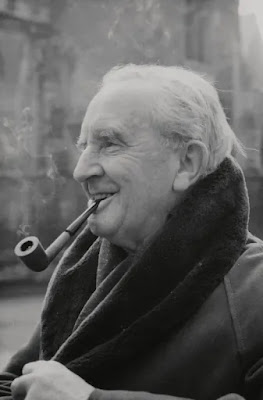But Tolkien has been back on my mind this summer as I've been re-listening to Andy Serkis' unabridged recording of the LoTR. What an experience! It's the best voice acting of a book I've heard since I listened to Jim Dale's masterful reading of the Harry Potter series.
Anyway, listening again to Tolkien's story, I'm struck once again by the paradox of his influence. As we all know, Tolkien is credited with creating, practically single-handedly, the genre of high/epic fantasy. Dwarves, elves, wizards, orcs, dragons, swords & sorcery, Dark Lords, epic quests, and the world building. The LoTR introduced it all. And survey the world it has birthed: The thousands upon thousands of fantasy books that have been written, borrowing heavily from Tolkien, reacting against Tolkien, or a straight up knock off of Tolkien. Think of the Dungeons & Dragons culture, and all the associated fantasy role-playing and LARPing. Think of all the fantasy movies and video games.
And yet!
And yet, given this massive influence, how many of these derivative stories embrace the subversive Christian element at the heart of Tolkien's epic? Everything in Tolkien's world has been borrowed and repurposed, except the heart of this story. The real heart. The deeply Christian heart.
Yes, of course, the broad plot of a group of adventurers going on a quest to defeat a Dark Lord to save the world has been regularly copied. But few have copied the nature of the quest, its central characters, and how the evil is defeated.
Again, you know all this, but it bears repeating.
First, the central heroes of the story are the hobbits. They have no superpowers. All they possess is a wholesome goodness and the sacrificial love of their friendship. Sam is the exemplar here. This subversion of power is nicely captured in Gandalf's response to Elrond as he picks the members of the fellowship to accompany Frodo. Elrond intends to leave both Merry and Pippin out of the group. Pippin strongly objects, and states that he's going to go with Frodo no matter what. Surprisingly, Gandalf comes to Pippin's defense:
'Neither does Frodo [understand the dangers ahead],' said Gandalf, unexpectedly supporting Pippin. 'Nor do any of us see clearly. It is true that if these hobbits understood the danger, they would not dare to go. But they would still wish to go, or wish that they dared, and be shamed and unhappy. I think, Elrond, that in this matter it would be well to trust rather to their friendship than to great wisdom. Even if you chose for us an elf-lord, such as Glorfindel, he could not storm the Dark Tower, nor open the road to the Fire by the power that is in him.'


